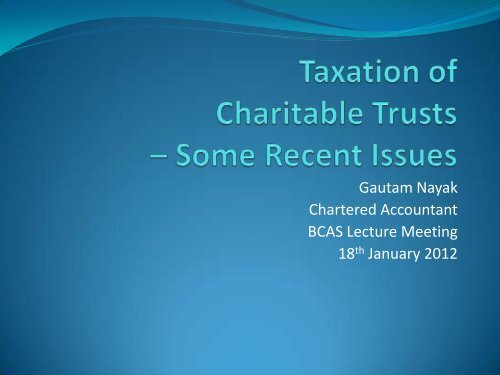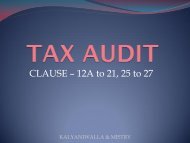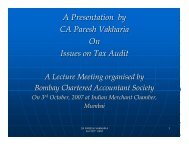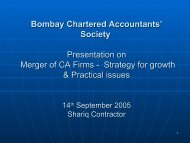Taxation of Charitable Trusts - Bombay Chartered Accountants Society
Taxation of Charitable Trusts - Bombay Chartered Accountants Society
Taxation of Charitable Trusts - Bombay Chartered Accountants Society
Create successful ePaper yourself
Turn your PDF publications into a flip-book with our unique Google optimized e-Paper software.
Gautam Nayak<br />
<strong>Chartered</strong> Accountant<br />
BCAS Lecture Meeting<br />
18 th January 2012
<strong>Charitable</strong> Purpose – s.2(15)<br />
6 limbs<br />
relief <strong>of</strong> the poor<br />
Education<br />
medical relief<br />
preservation <strong>of</strong> environment (including watersheds, forests &<br />
wildlife)<br />
Preservation <strong>of</strong> monuments/places/objects <strong>of</strong> artistic/historic<br />
interest<br />
Advancement <strong>of</strong> any other object <strong>of</strong> general utility<br />
CNK 2
<strong>Charitable</strong> Purpose – s.2(15)<br />
Advancement <strong>of</strong> any other object <strong>of</strong> general public utility<br />
Amendment w.e.f. AY 2009-10<br />
not charitable purpose if it involves carrying on <strong>of</strong> :<br />
any activity in nature <strong>of</strong> trade, commerce or business, or<br />
Any activity <strong>of</strong> rendering any service in relation to trade, commerce or<br />
business<br />
for a cess/fee/any other consideration, irrespective <strong>of</strong> nature <strong>of</strong> use/<br />
application/retention <strong>of</strong> income from such activity<br />
Exception – if aggregate value <strong>of</strong> receipts from such activities is Rs.10<br />
lakh (Rs.25 lakh wef AY 2012-13) or less in the previous year<br />
CNK 3
<strong>Charitable</strong> Purpose – s.2(15)<br />
Explanatory Memorandum<br />
It has been noticed that a number <strong>of</strong> entities operating on commercial<br />
lines are claiming exemption on their income either under section<br />
10(23C) or section 11 <strong>of</strong> the Act on the ground that they are charitable<br />
institutions. This is based on the argument that they are engaged in the<br />
“advancement <strong>of</strong> an object <strong>of</strong> general public utility” as is included in the<br />
fourth limb <strong>of</strong> the current definition <strong>of</strong> “charitable purpose”. Such a<br />
claim, when made in respect <strong>of</strong> an activity carried out on commercial<br />
lines, is contrary to the intention <strong>of</strong> the provision.<br />
With a view to limiting the scope <strong>of</strong> the phrase “advancement <strong>of</strong> any<br />
other object <strong>of</strong> general public utility”, it is proposed to amend section<br />
2(15) so as to provide that “the advancement <strong>of</strong> any other object <strong>of</strong><br />
general public utility” shall not be a charitable purpose if it involves the<br />
carrying on <strong>of</strong> ………….<br />
CNK 4
<strong>Charitable</strong> Purpose – s.2(15)<br />
Amendment to “<strong>Charitable</strong> Purpose” – FM’s Speech<br />
The intention is to limit the benefit to entities which are engaged in<br />
activities such as relief <strong>of</strong> the poor, education, medical relief and any other<br />
genuine charitable purpose, and to deny it to purely commercial and<br />
business entities which wear the mask <strong>of</strong> a charity.<br />
I once again assure the House that genuine charitable organisations will<br />
not in any way be affected.<br />
The CBDT will, following the usual practice, issue an explanatory circular<br />
containing guidelines for determining whether an entity is carrying on any<br />
activity in the nature <strong>of</strong> trade, commerce or business or any activity <strong>of</strong><br />
rendering any service in relation to any trade, commerce or business.<br />
Whether the purpose is a charitable purpose will depend on the totality <strong>of</strong><br />
the facts <strong>of</strong> the case.<br />
Ordinarily, Chambers <strong>of</strong> Commerce and similar organisations rendering<br />
services to their members would not be affected by the amendment and<br />
their activities would continue to be regarded as “advancement <strong>of</strong> any<br />
other object <strong>of</strong> general public utility.”<br />
FM’s assurance vs. express language <strong>of</strong> section<br />
CNK 5
<strong>Charitable</strong> Purpose – s.2(15)<br />
Amendment – CBDT Circular No.11 <strong>of</strong> 2009 dated 19.11.2008<br />
Where the purpose is relief <strong>of</strong> the poor, education or medical relief,<br />
‘charitable purpose’ even if it incidentally involves the carrying on <strong>of</strong><br />
commercial activities<br />
Relief to poor includes relief to destitute, orphans/ the handicapped,<br />
disadvantaged women/ children, small & marginal farmers, indigent<br />
artisans/ senior citizens in need <strong>of</strong> aid<br />
Eligible for exemption subject to s.11(4) & 11(4A)<br />
Whether carrying on an activity in the nature <strong>of</strong> trade, commerce or<br />
business is question <strong>of</strong> fact to be decided based on the nature, scope,<br />
extent and frequency <strong>of</strong> the activity<br />
If industry/trade associations have dealings only with their members,<br />
exempt on grounds <strong>of</strong> mutuality<br />
If they have dealings with non-members, now governed by amended<br />
definition <strong>of</strong> charitable purpose<br />
Each case would be decided on its own facts<br />
CNK 6
<strong>Charitable</strong> Purpose – s.2(15)<br />
Meaning <strong>of</strong> “Business” for purposes <strong>of</strong> s.2(15)<br />
Institute <strong>of</strong> <strong>Chartered</strong> <strong>Accountants</strong> <strong>of</strong> India v. DGIT(E) 202 Taxman 1 (Del) -<br />
Utilisation <strong>of</strong> the funds or income earned, whether for charitable purpose or<br />
otherwise, is not relevant now in view <strong>of</strong> the first proviso and cannot be a<br />
determining factor for deciding whether assessee is covered by section 2(15)<br />
A very broad and extended definition <strong>of</strong> the term 'business' is not intended for<br />
the purpose <strong>of</strong> interpreting and applying the first proviso to section 2(15) to<br />
include any transaction for a fee or money. An activity would be considered<br />
'business' if it is undertaken with a pr<strong>of</strong>it motive, but in some cases this may not<br />
be determinative. Normally, the pr<strong>of</strong>it motive test should be satisfied but in a<br />
given case activity may be regarded as business even when pr<strong>of</strong>it motive<br />
cannot be established/proved. In such cases, there should be evidence and<br />
material to show that the activity has continued on sound and recognized<br />
business principles, and pursued with reasonable continuity. There should be<br />
facts and other circumstances which justify and show that the activity<br />
undertaken is in fact in the nature <strong>of</strong> business.<br />
CNK 7
<strong>Charitable</strong> Purpose – s.2(15)<br />
Amendment Impact<br />
Objects become partly charitable and partly non-charitable<br />
Property held partly in trust for charitable or religious purposes<br />
Section 11(1)(b) applicable<br />
Trust exempt only if set up prior to 1962<br />
Effectively such trusts (pre-1962) will get exemption for all income spent<br />
for other objects<br />
<strong>Trusts</strong> set up after 1962 will lose exemption altogether in respect <strong>of</strong> entire<br />
income<br />
S.10(23C)(iv) & (v) cases may also be affected<br />
CNK<br />
8
<strong>Charitable</strong> Purpose – s.2(15)<br />
Some Impacted Objects <strong>of</strong> General Public Utility<br />
Promotion <strong>of</strong> literature, arts & culture<br />
Promotion <strong>of</strong> trade & commerce<br />
Furtherance <strong>of</strong> National Integration<br />
Promotion <strong>of</strong> International Understanding<br />
Promotion <strong>of</strong> Sports<br />
Promotion <strong>of</strong> Handicrafts<br />
Care & Protection <strong>of</strong> Animals & Birds (other than wildlife)<br />
CNK 9
<strong>Charitable</strong> Purpose – s.2(15)<br />
Impact - Chambers <strong>of</strong> Commerce/Trade Associations<br />
Mutuality v. benefit <strong>of</strong> general public utility<br />
Meaning <strong>of</strong> “in relation to trade, commerce or business”<br />
All activities in relation to trade, commerce or business, even if not in the<br />
nature <strong>of</strong> trade, commerce or business<br />
Subscription exempt<br />
Income from specific services to members taxable u/s.28(iii) r.w.s. 2(24)(v) –<br />
whether holding <strong>of</strong> seminars amounts to specific services?<br />
CIT v. Royal Western India Turf Club 24 ITR 551 (SC) - similar amenities given to<br />
members & non-members – fees charged to both – not exempt<br />
CIT v. Calcutta Stock Exchange Association Ltd. 36 ITR 222 (SC)<br />
“The words ‘performing specific services’ [in section 10(6)] in our opinion, mean, in the context,‘<br />
conferring particular benefits’ on the members. The word ‘services’ is a term <strong>of</strong> a very wide import,<br />
but in the context <strong>of</strong> Section 10 <strong>of</strong> the Act, its use excludes its theological or artistic usage. With<br />
reference to a trade, pr<strong>of</strong>essional or similar association, the performing <strong>of</strong> specific services must<br />
mean conferring on its members some tangible benefit which otherwise would not be available to<br />
them as such, except for payment received by the association in respect <strong>of</strong> those services.”<br />
CNK<br />
10
<strong>Charitable</strong> Purpose – s.2(15)<br />
Impact - Chambers <strong>of</strong> Commerce/Trade Associations……<br />
Interest income – whether taxable?<br />
Taxable<br />
CIT v. Common Effluent Treatment Plant (Thane Belapur) Association 328 ITR 362 (Bom)<br />
Sports Club <strong>of</strong> Gujarat Ltd. v. CIT 171 ITR 504 (Guj)<br />
Madras Gymkhana Club v. Dy. CIT 328 ITR 348 (Mad)<br />
CIT v. Bangalore Club 287 ITR 263 (Kar)<br />
Amar Singh Club v. Union <strong>of</strong> India 184 Taxman 481 (J & K)<br />
Devi Ahilya New Cloth Market Co. Ltd. v. CIT 222 CTR (MP) 583<br />
Not Taxable<br />
• Canara Bank Golden Jubilee Staff Welfare Fund v. Dy. CIT 308 ITR 202 (Kar)<br />
DIT(E) v. All India Oriental Bank <strong>of</strong> Commerce Welfare <strong>Society</strong> 130 Taxman 575 (Del)<br />
CIT v. Standing Conference <strong>of</strong> Public Enterprises 319 ITR 179 (Del)<br />
Deficit from mutual activities can be set <strong>of</strong>f up to 50% <strong>of</strong> business income/other<br />
income – s.44A<br />
CNK<br />
11
<strong>Charitable</strong> Purpose – s.2(15)<br />
Fund Raising Activities – whether in nature <strong>of</strong> trade, commerce or<br />
business?<br />
Musical Concerts/Movie Shows<br />
Publishing <strong>of</strong> Souvenirs<br />
Art Auctions<br />
Gaushalas selling milk and milk products<br />
● Inmates residing in ashram preaching Gandhian philosophy, carrying on<br />
agriculture, running gaushala, publishing & selling books in Ashram, having<br />
conferences and having paid accommodation and boarding for visitors<br />
• Sevagram Ashram Pratishthan v. CIT 129 TTJ (Nag) 506 - Object <strong>of</strong> the amended<br />
proviso to s. 2(15) is to create a barrier for those assessees who are engaged in<br />
business activities in the garb <strong>of</strong> charitable purpose and it is not meant for the<br />
assessees who are really engaged in charitable purpose<br />
CNK<br />
12
<strong>Charitable</strong> Purpose – s.2(15)<br />
Hiring <strong>of</strong> auditorium/halls/wadis – mere letting not business<br />
DIT(E) v. Sahu Jain Trust 2011-TIOL-204-HC-KOL-IT<br />
Subharam Trust v. DIT (E) 126 ITD 33 (Bang) – land taken on lease from trustee,<br />
hall constructed and leased back to trustee<br />
Dharamshalas – object <strong>of</strong> general public utility or religious?<br />
Raghunath Das Parihar Dharmshala v. CIT 158 ITR 432 (Raj)<br />
Shri Dhakad Samaj Dharamshala Bhawan Trust v. CIT 302 ITR 321 (MP) – merely<br />
because dharamshala is constructed at religious place, it cannot be said to be<br />
for religious purposes<br />
Provision <strong>of</strong> food for poor brahmins is religious purpose – CIT v. Ahmedabad<br />
Rana Caste Association 88 ITR 354 (Guj), affirmed in 140 ITR 1 (SC)<br />
Holding <strong>of</strong> exhibitions – whether charitable activity by itself?<br />
<strong>Society</strong> for Small & Medium Enterprises v. DIT(E) 57 DTR (Del)(Trib) 154<br />
CNK<br />
13
<strong>Charitable</strong> Purpose – s.2(15)<br />
Royalty for use <strong>of</strong> logo, books, co-branding<br />
Printing & Publication <strong>of</strong> Books, purchase & sale <strong>of</strong> cassettes and VCDs<br />
Educational activities – Prasanna Trust v. DIT(E) 36 SOT 135 (Bang)<br />
Sale <strong>of</strong> handicrafts/greeting cards<br />
Micr<strong>of</strong>inance - whether charitable activity?<br />
ADIT(E) v. Bharatha Swamukhi Samste 28 DTR (Bang)(Trib) 113<br />
Disha India Micro Credit v. CIT 2011-TIOL-119-ITAT-DEL<br />
Contrary - Janalakshmi Social Services v. DIT(E) 33 SOT 197 (Bang)<br />
Holding <strong>of</strong> Seminars<br />
Investment <strong>of</strong> Surplus funds not business activity<br />
ITO v. Jesuit Conference <strong>of</strong> India 47 SOT 29 (Del)<br />
Running <strong>of</strong> coaching classes – whether business<br />
DIT(E) v. Institute <strong>of</strong> <strong>Chartered</strong> <strong>Accountants</strong> <strong>of</strong> India 202 Taxman 138 (Del)<br />
CNK<br />
14
<strong>Charitable</strong> Purpose – s.2(15)<br />
Telecasting & Broadcasting<br />
Sri Venkateswara Bhakti Channel v. ACIT 11 Taxmann.com 394 (Hyd) –<br />
production <strong>of</strong> religious feature films, serials, etc. for temple by s.25 co<br />
CIT v. A.Y. Broadcast Foundation 11 Taxmann.com 240 (Ker) – production <strong>of</strong><br />
television and radio programmes for telecasting & broadcasting through<br />
assessee’s own network or through hired network not object <strong>of</strong> general public<br />
utility<br />
MARAA v. ITO(E) 4 ITR (Trib) 398 (Bang) – setting up community radio stations<br />
as per agreement with UNESCO – education <strong>of</strong> general public at large regarding<br />
community media and its potential is advancement <strong>of</strong> any other object <strong>of</strong><br />
general public utility – fees received from UNESCO is towards reimbursement <strong>of</strong><br />
cost incurred for training & educational activity for community members – not<br />
activity in nature <strong>of</strong> trade, commerce or business<br />
CNK<br />
15
<strong>Charitable</strong> Purpose – s.2(15)<br />
Club having sports activities, restaurant and letting grounds and halls?<br />
CIT v. Delhi Golf Club Ltd. 2011-TIOL-310-HC-DEL-IT – allowing golf course to be<br />
used by casual members or non-members on higher fee cannot be construed to<br />
be carrying on <strong>of</strong> commercial activities/business<br />
Conduct <strong>of</strong> Research Projects<br />
ICAI Accounting Research Foundation v. DGIT (E) 321 ITR 73 (Del) – imparting,<br />
spreading and promoting knowledge, learning, education, etc. in fields relating<br />
to pr<strong>of</strong>ession <strong>of</strong> accountancy – services <strong>of</strong> carrying out research projects<br />
provided to various Govt. bodies – not business/commercial activity or in<br />
relation to trade, commerce or business<br />
CNK<br />
16
<strong>Charitable</strong> Purpose – s.2(15)<br />
Gross Receipts less than Rs.25 lakh<br />
Gross Receipts from only specified activities<br />
May be charitable in one year, not charitable in another<br />
Trust following mercantile system – gross income or gross receipts?<br />
Whether registration u/s.12AA can be refused on ground <strong>of</strong> activities falling within<br />
first proviso to s.2(15)?<br />
Whether cancellation <strong>of</strong> registration u/s.12AA possible on ground <strong>of</strong> activity carried<br />
on in nature <strong>of</strong> business or in relation to business?<br />
Cancellation possible u/s.12AA(3) only on following grounds<br />
Activities are not genuine<br />
Activities are not being carried out in accordance with the objects<br />
CNK<br />
17
<strong>Charitable</strong> Purpose – s.2(15)<br />
Position on Loss <strong>of</strong> Exemption<br />
Direct Expenses incurred for Earning Income would be deductible from the Gross<br />
Income<br />
Establishment Expenses incurred would also be deductible<br />
Income would be taxable at slab rates <strong>of</strong> tax (for trusts & societies), but at 30% for<br />
companies<br />
CNK<br />
18
Education & Educational Institution<br />
Meaning <strong>of</strong> term “ education” – whether restricted to formal classroom<br />
education for purposes <strong>of</strong>:<br />
S.10(23C)<br />
S.11 r.w.s. 2(15)<br />
Process <strong>of</strong> training and developing knowledge, skill, mind and character <strong>of</strong><br />
students by normal schooling - Sole Trustee, Loka Shikshana Trust v. CIT 101 ITR<br />
234 (SC)<br />
Meaning in s.10(22) narrower than in s.2(15) – Saurashtra Education<br />
Foundation v. CIT 273 ITR 139 (Guj) – affiliation to recognised university, board,<br />
essential for s.10(22), contrary view in CIT v. Doon Foundation 154 ITR 208 (Cal)<br />
Objects <strong>of</strong> educating public in regard to safety, protection & health among<br />
industrial workers, to organise & conduct programmes, lectures, conferences &<br />
other activities for promoting free discussions on all matters & questions<br />
relating to safety measures, procedures & research, to conduct educational<br />
campaigns to arouse & maintain public opinion & interest <strong>of</strong> employers &<br />
workers & their support to safety and accident prevention – amounts to<br />
education - DIT(E) v. National Safety Council 305 ITR 257 (Bom)<br />
CNK<br />
19
Education & Educational Institution<br />
Conduct <strong>of</strong> music classes and grant <strong>of</strong> certificates or grades issued by foreign<br />
body - run like any school or educational institution in a systemic manner with<br />
regular classes, vacations, attendance requirements, enforcement <strong>of</strong> discipline,<br />
etc. – is educational institution - Delhi Music <strong>Society</strong> v. DGIT 2011-TIOL-862-<br />
HC-DEL-IT<br />
Regulatory Body conducting examinations – whether educational<br />
institution<br />
Institute <strong>of</strong> <strong>Chartered</strong> <strong>Accountants</strong> <strong>of</strong> India v. DGIT (E) 202 Taxman 1 (Del) -<br />
There is a clear distinction between coaching classes conducted by private<br />
coaching institutions and the courses and examinations which are held by the<br />
institute. A private coaching institute has no statutory or regulatory duty to<br />
perform. It cannot award degrees or enroll members as chartered accountants.<br />
These activities undertaken by the institute satisfy the requirement <strong>of</strong> the term<br />
'education'.<br />
CIT v. Association <strong>of</strong> Financial Planners 2011-TIOL-465-HC-DEL-IT –<br />
administering CFP certification in India, imparting training through approved<br />
Education Providers – amounts to educational institution<br />
CNK<br />
20
Education & Educational Institution<br />
Whether mere fact <strong>of</strong> surplus would disentitle an educational institution<br />
from exemption u/s.10(23C)?<br />
So long as no person entitled to benefit <strong>of</strong> surplus and utilised for promotion <strong>of</strong><br />
objects – Governing Body <strong>of</strong> Rangaraya Medical College 117 ITR 284 (AP)<br />
the fact that a surplus may incidentally arise from the activities <strong>of</strong> the trust,<br />
after meeting the expenditure incurred for conducting educational activities<br />
would not disentitle the trust <strong>of</strong> the benefit <strong>of</strong> the provisions <strong>of</strong> section 10(23C)<br />
- Vanita Vishram Trust v. CIT 327 ITR 121 (Bom)<br />
Merely because pr<strong>of</strong>its have resulted from the activity <strong>of</strong> imparting education<br />
that would not change the character <strong>of</strong> the institution existing solely for<br />
educational purpose - Pinegrove International <strong>Charitable</strong> Trust v. Union <strong>of</strong> India<br />
327 ITR 73 (Punj. & Har.)<br />
CNK<br />
21
Education & Educational Institution<br />
<strong>Society</strong> running schools & colleges<br />
Whether <strong>Society</strong> itself is educational institution or each school and college?<br />
Aditanar Educational Institution 224 ITR 310 (SC)<br />
How limit <strong>of</strong> gross receipts <strong>of</strong> Rs.1 crore in s.10(23C)(iiiad) to be viewed – qua<br />
society, or qua each school/college – Jat Education <strong>Society</strong> v. Dy. CIT 141 TTJ<br />
316 (Del)<br />
CNK<br />
22
Section 80G Approval<br />
Earlier approval granted for 3 years at a time<br />
Amendment to s.80G(5)(vi) by Finance (No.2) Act 2009 w.e.f.1.10.2009 –<br />
the institution or fund is for the time being approved by the Commissioner in<br />
accordance with the rules made in this behalf ; and<br />
Provided that any approval shall have effect for such assessment year or years, not<br />
exceeding five assessment years, as may be specified in the approval.<br />
● Explanatory Memorandum to Finance (No.2) Bill 2009<br />
Existing approvals expiring on or after 1st October, 2009 shall be deemed to have<br />
been extended in perpetuity unless specifically withdrawn<br />
● CBDT Cir No 7 dated 27.10.2010<br />
It appears that some doubts still prevail about the period <strong>of</strong> validity <strong>of</strong> approval<br />
under section 80G subsequent to October 1, 2009, especially in view <strong>of</strong> the fact<br />
that no corresponding change has been made in rule 11A(4). To remove any<br />
doubts in this regard, it is reiterated that any approval under section 80G(5) on or<br />
after October 1, 2009 would be a one time approval which would be valid till it is<br />
withdrawn.<br />
● Babu Hargovind Dayal Trust v. ITAT 199 Taxman 138 (All)<br />
CNK<br />
23
Income<br />
Voluntary Contributions to Corpus – Whether Income?<br />
Term “Corpus” not defined in the Act<br />
Donation to Building Fund – whether corpus?<br />
Can Corpus donations be treated as income <strong>of</strong> the trust?<br />
Amendment to s.2(24)(iia) wef 1.4.1989 - exemption u/s.11(1)(d)<br />
Can corpus donations be received through <strong>of</strong>feratory boxes?<br />
Prabodhan Prakashan v. ADIT 50 ITD 135 (Bom)<br />
Shri Digambar Jain Naya Mandir v. ADIT 70 ITD 121 (Cal)<br />
Contrary view in Shree Mahadevi Tirath Sharda Ma Seva Sangh v. ITO 133<br />
TTJ (UO) 157 (Chd)<br />
Can amounts received from parents <strong>of</strong> students at time <strong>of</strong>/after<br />
admission be regarded as voluntary contributions to corpus?<br />
Dy.CIT v. Vellore Institute <strong>of</strong> Technology 12 Taxman.com 272 (Chenn)<br />
Can corpus donations be applied on objects <strong>of</strong> the trust? Would it<br />
amount to application <strong>of</strong> income?<br />
CNK 24
Depreciation<br />
Allowable as per commercial concept <strong>of</strong> income<br />
Applicability <strong>of</strong> rates as per Income Tax Rules<br />
Allowability where:<br />
capital asset is investment<br />
capital asset claimed as application <strong>of</strong> income – double deduction?<br />
• Framjee Cawasjee Institute 109 CTR 463 (Bom)<br />
• Institute <strong>of</strong> Banking Personnel Selection 264 ITR 110 (Bom)<br />
• CIT v. Market Committee, Pipli 330 ITR 16 (P&H)<br />
• CIT v. Tiny Tots Education <strong>Society</strong> 330 ITR 21 (P&H)<br />
capital asset acquired out <strong>of</strong> or received as corpus donation<br />
capital asset acquired out <strong>of</strong> accumulation<br />
CNK 25
Carry forward <strong>of</strong> Deficit<br />
No specific provision for carry forward <strong>of</strong> deficit<br />
No limitation u/s.11 that income should be applied for charitable purposes<br />
only in year in which the income has arisen<br />
CBDT Circular No.100 <strong>of</strong> 24.1.1973 – repayment <strong>of</strong> loan eligible<br />
Expenditure incurred in an earlier year can be adjusted against the income<br />
<strong>of</strong> a subsequent year<br />
CIT v. Maharana <strong>of</strong> Mewar <strong>Charitable</strong> Foundation (1987) 164 ITR 439 (Raj)<br />
CIT v. Shri Plot Swetambar Murti Pujak Jain (1995) 211 ITR 293 (Guj)<br />
CIT v. Matriseva Trust 242 ITR 20 (Mad)<br />
CIT v. Institute <strong>of</strong> Banking Personnel Selection 264 ITR 110 (Bom)<br />
CNK 26
Accumulation u/s.11(2)<br />
Single form No.10 for multiple years v. Multiple Forms<br />
M.P. Gandhi Trust v. ADIT 8 SOT 808 (Mum) – application to be made each year<br />
– general application for accumulation over a period <strong>of</strong> time not possible<br />
Cotton Textiles Export Promotion Council v. ITO 20 SOT 187 (Mum) – notice for<br />
accumulation possible not only for current assessment year, but also for<br />
subsequent assessment years<br />
Specific Purposes v. General Objects<br />
Objects is different from purposes - DIT (E) v. Trustees <strong>of</strong> Singhania <strong>Charitable</strong><br />
Trust 199 ITR 819 (Cal), CIT v. M. Ct. Muthiah <strong>Charitable</strong> Trust 245 ITR 400(Mad)<br />
CIT v. Hotel & Restaurant Association 261 ITR 190 (Del), DIT(E) v. Daulat Ram<br />
Education <strong>Society</strong> 278 ITR 260, DIT(E) v. Eternal Science <strong>of</strong> Man’s <strong>Society</strong> 290<br />
ITR 535 (Del), Bharat Kalyan Pratishthan v. DIT(E) 299 ITR 406 (Del), DIT v. Mitsui<br />
& Co Environmental Trust 303 ITR 111(Del), Bharat Krishak Samaj v. DDIT(E) 306<br />
ITR 153 (Del)<br />
CNK 27
Accumulation u/s.11(2)<br />
Delay in filing form No.10<br />
CBDT Circular No.273 dated 3.6.1980<br />
Genuineness <strong>of</strong> trust not in doubt<br />
Failure to give notice and invest due to oversight<br />
No benefit to trustees/settlor by such failure<br />
Investment <strong>of</strong> surplus before grant <strong>of</strong> extension <strong>of</strong> time<br />
Accumulation necessary for carrying out objects <strong>of</strong> trust<br />
CIT v. Nagpur Hotel Owners Association 247 ITR 201 (SC)<br />
Can be filed before completion <strong>of</strong> assessment<br />
<strong>Taxation</strong> <strong>of</strong> Unspent Amount<br />
Year 6<br />
Whether any further accumulation permissible?<br />
CNK 28
Capital Gains<br />
To be computed on commercial income basis – not as per s.48<br />
Treated as application <strong>of</strong> income for charitable purposes and exempt if<br />
reinvested in capital asset<br />
No time limit for reinvestment – investment to be seen at end <strong>of</strong> year<br />
Even 15 day fixed deposit would qualify<br />
CBDT Instruction No.883 dated 25.9.1975 – 6 months FDR<br />
CIT v. Hindustan Welfare Trust 206 ITR 138 (Cal) – 60 days FDR<br />
ADIT(E) v. Murugappa Chettiar Trust 303 ITR 360 (Mad) – even current account<br />
is deposit with scheduled bank - qualifies<br />
Investment permissible in subsequent year as well – option under expln to<br />
s.11(1)<br />
CIT v. East India <strong>Charitable</strong> Trust 206 ITR 152 (Cal)<br />
CNK 29
CNK 30





